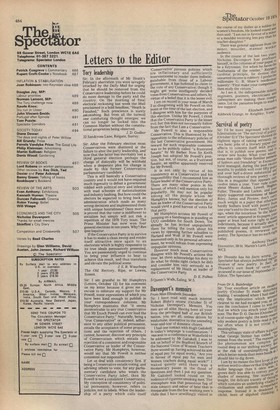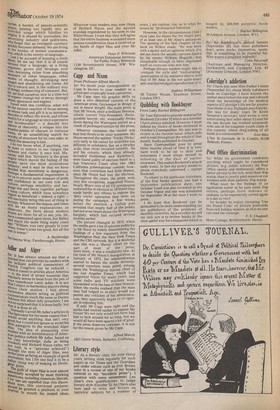Survival of poetry
Sir: I'd be more impressed with )70,r, fulminations on 'The survival of poet* si 01 gcht ot eb es tr 5signs i f The f Spectatortaking sesr 000wsfyd the et two basic jobs of a literary paper Os. affects to concern itself with poetrY. that is, to publish new poems, and l° review new books. What your ati°nr1Y5. mous man calls "those familiar patter of fashion and friendship" in Encounter have managed, during the past LW ,e months, to publish well over fifty P°e1,51 and over half-a-dozen substantial and thorough reviews of new poetry this in a magazine that appears 0.11-s twelve times a year. Your rude noLs‘,e, about Messrs Auden, Lowell, HuS"`„1: Thwaite and Larkin, and P", thinly supported encomiums of MORiley, James and Prvnne, don't carolle much weight in a paper that otherw/L hardly bothers itself with poetry fr°-1.5 one year's end to the next. Twenty Yeae, ago, when the notorious 'In the NW', ment' article appeared in its pages, Y°;;,, paper at least had some right to indictments, because it actually shoni some creative and critical concern; published poems, it reviewedlleni today. The Spectator has no such rig At ho nnye i,0 h WC2.1 nloit Encounter, 59 St. Martin's La Mr Thwuite has his facts wrong. Spectator has always published regt4'" reviews of new poetry. In fact' WI; Thwaite's own book of verse Eredviiteowr,eidhi en so puer cist as tuoer of September 21 From Dr A. Bainbridge pSreoiraery i: dtYnogu.r excellent article on Moder° (10 wondered r e5d) whenmade f had ur er oi :11 why the implication which seed% clearest to me had escaped you; at rate the conclusion I came to was 11that on which you struck your closil note. The Rev D. G. Davies (October n is of course quite right: the main reas° why modern poetry is little read is ,r,113 ,2s mtoeoanoifntgenlesws.hen it is not trivial • of This unhappy state of affairs is part e what George Steiner has called "t1,1„r retreat from the word." The reasons t'd the phenomenon are complex 34, rooted deep in our shifting society. Pes at the risk of oversimplifying"I should beliktetetromdiingddsotwhanu mine a duller languagelbawynongroud amt goeeoa observe eatr vnh the first ihr sao ttn I Eco env gewiri soabsf .:151 aeet grows daily less able to convey preciof shades of meaning, fine nuances „t wi n hs iignhhts, ut shtea idnesl incna ttel ntdrearcieyri yr go t vita itrihetic civilisation and enlivens syrnPatT by response. Instead it is deadeneu it cliche, born of slipshod thinking; Spectator October 19 1974 Carries a burden of pseudo-scientific Jargon, passing too rapidly into an everyday usage which falsifies its origins; it is abused by journalists, the advertising industry and politicians, who forget that an overspent currency 9uiekly becomes debased. We are living ln the heyday of instant communication, which is the enemy of language.
Lest I be accused of wanting a static idiom, let me say that it is of course obvious that a language, as a living
anism, grows and develops over time, becoming richer from absorbing elements of other languages, other modes of thought; developing new usages and abandoning old forms. All this is natural and, in the ordinary way Of things, undeserving of comment. But, Sir, We find ourselves now in a time not ot organic change but ot decay through abuse, ignorance and neglect. Faced with this condition, what will bS the natural reaction of those among us whose task and gift it is to interpret, describe or reflect the world, and whose need is for a language at once expressive and invulnerable? — a descent into silence or obscenity, a relapse into the 7Illtnbo-jumbo of obscure or tortuous hrrns, or an unsatisfying search for nowa.
• —LY of structure for its own sake, in Which the meaning is lost.
I do not know what, if anything, can Ke done to restore to our tongue the richness and clarity it once had. Ma:aulaY said that 'literature is the great 'Nine which moves the feeling of the People upon the most momentous dsubjects', and it may be that we have ecided that movement isdangerous. Perhaps a fundamental-requirement is for us to recover some measure of pride and confidence in our own role and culture; perhaps sensibility and language rise and decay together; perhaps a mass culture, which most nowadays regard as beneficial — indeed, a right — ikt,Iltrinevitably bring this sort of thing in ain. Whatever the reason, and there be as many explanations as ;:luservers, the facts about modern retters are there for all to see; you, Sir, 'lave commented upon them, but Belloc ` tcl much the same thing many years go: "William, you vary greatly in your verse; Some's none too good, but all the rest is worse."
74 r‘
A. Bainbridge —heyne Way, Farnborough, Hants.



































 Previous page
Previous page